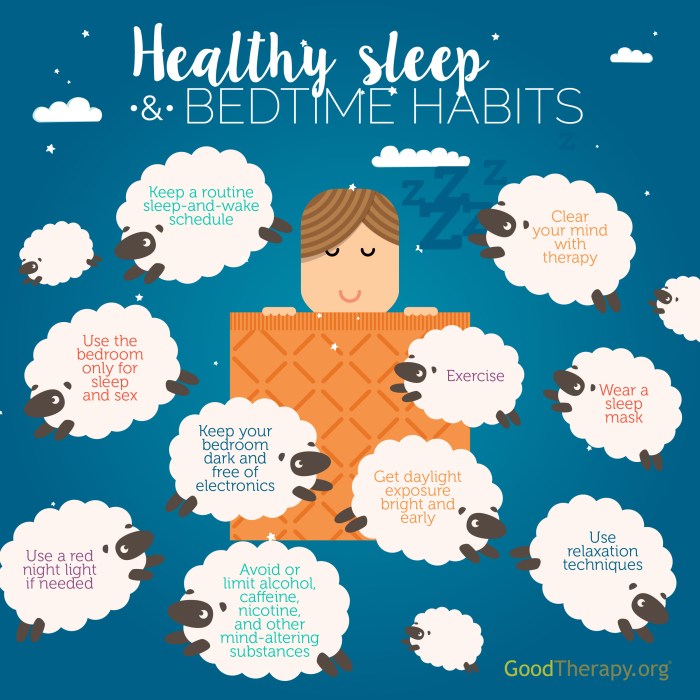Starting with sleep hygiene, this paragraph aims to grab the attention of readers with a cool high school vibe. We’re diving into the importance of good sleep habits and how they can impact your overall health.
Let’s break down the key components of a solid sleep routine, from winding down before bed to creating a cozy sleep environment. Plus, we’ll touch on the effects of technology on your sleep quality.
Importance of Sleep Hygiene
Sleep hygiene is super important for keeping your mind and body in top shape. Good sleep habits can make a big difference in your overall health and well-being.
Impact of Poor Sleep Hygiene
- Feeling groggy and tired throughout the day
- Difficulty concentrating in class or on assignments
- Increased risk of accidents or injuries due to lack of focus
Benefits of Good Sleep Hygiene Practices
- Improved memory and cognitive function
- Enhanced mood and emotional well-being
- Boosted immune system to fight off illnesses
Components of Sleep Hygiene

Having a good sleep hygiene routine is crucial for overall health and well-being. It involves various components that can help improve the quality of your sleep.
Consistent Sleep Schedule
Maintaining a consistent sleep schedule is key to good sleep hygiene. Going to bed and waking up at the same time every day helps regulate your body’s internal clock, making it easier to fall asleep and wake up naturally.
- Avoiding caffeine, nicotine, and heavy meals close to bedtime
- Creating a relaxing bedtime routine to signal to your body that it’s time to wind down
- Limiting exposure to screens and bright lights before bed
Sleep Environment
The sleep environment plays a significant role in the quality of your sleep. Creating a conducive space for sleep can help you relax and drift off easily.
- Keep your bedroom cool, quiet, and dark
- Invest in a comfortable mattress and pillows
- Avoid using electronic devices in bed
Tips for Improving Sleep Hygiene
To ensure better sleep hygiene, it’s essential to follow certain strategies that can help you wind down before bedtime, create a comfortable sleep environment, and manage stress and anxiety effectively.
Winding Down Before Bedtime
- Avoid screens: Limit exposure to screens such as smartphones, tablets, and computers at least an hour before bedtime as the blue light emitted can disrupt your sleep.
- Relaxing activities: Engage in calming activities like reading a book, taking a warm bath, or practicing deep breathing exercises to signal your body that it’s time to wind down.
- Avoid caffeine and heavy meals: Refrain from consuming caffeine and large meals close to bedtime as they can interfere with your ability to fall asleep.
Creating a Comfortable Sleep Environment
- Optimal room temperature: Keep your bedroom cool, quiet, and dark to create a conducive sleep environment that promotes relaxation.
- Comfortable bedding: Invest in a comfortable mattress and pillows that support your body and help you maintain proper sleep posture throughout the night.
- Reduce noise and distractions: Use earplugs or white noise machines to block out disturbances that may disrupt your sleep.
Managing Stress and Anxiety
- Establish a bedtime routine: Develop a relaxing bedtime routine that can help you unwind and signal to your body that it’s time to sleep.
- Practice mindfulness: Engage in mindfulness meditation or yoga to reduce stress and anxiety levels, promoting a calmer state of mind before bed.
- Seek professional help: If stress and anxiety significantly impact your sleep, consider speaking to a therapist or counselor to address underlying issues and develop coping strategies.
Effects of Technology on Sleep Hygiene

Technology has become an integral part of our daily lives, but its impact on our sleep hygiene is often overlooked. The use of electronic devices before bedtime can significantly affect the quality of our sleep, making it harder to fall asleep and reducing the overall duration of sleep.
Screen Time Before Bed
Spending time on screens, such as smartphones, tablets, or computers, before going to bed can disrupt our natural sleep-wake cycle. The blue light emitted by these devices can suppress the production of melatonin, the hormone responsible for regulating sleep, making it difficult to unwind and fall asleep.
- Avoid screen time at least an hour before bedtime to allow your brain to relax and prepare for sleep.
- Use blue light filters on your devices or wear blue light-blocking glasses to minimize the impact on melatonin production.
Setting Boundaries with Electronic Devices
It is essential to set boundaries with electronic devices to improve sleep hygiene. Establishing a technology-free zone in the bedroom can help signal to your brain that it is time to wind down and prepare for sleep.
- Create a bedtime routine that does not involve screens, such as reading a book, meditating, or listening to calming music.
- Avoid using electronic devices as alarm clocks, as the temptation to check notifications or messages can disrupt your sleep.
Alternatives to Screen Time
Instead of relying on screens before bed, consider incorporating alternative activities that promote relaxation and better sleep quality.
- Practice relaxation techniques such as deep breathing, progressive muscle relaxation, or yoga to calm your mind and body before sleep.
- Engage in a calming bedtime routine, such as taking a warm bath, drinking herbal tea, or writing in a gratitude journal to promote a sense of peace and relaxation.
